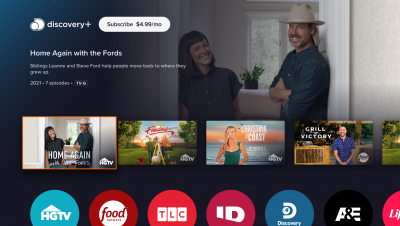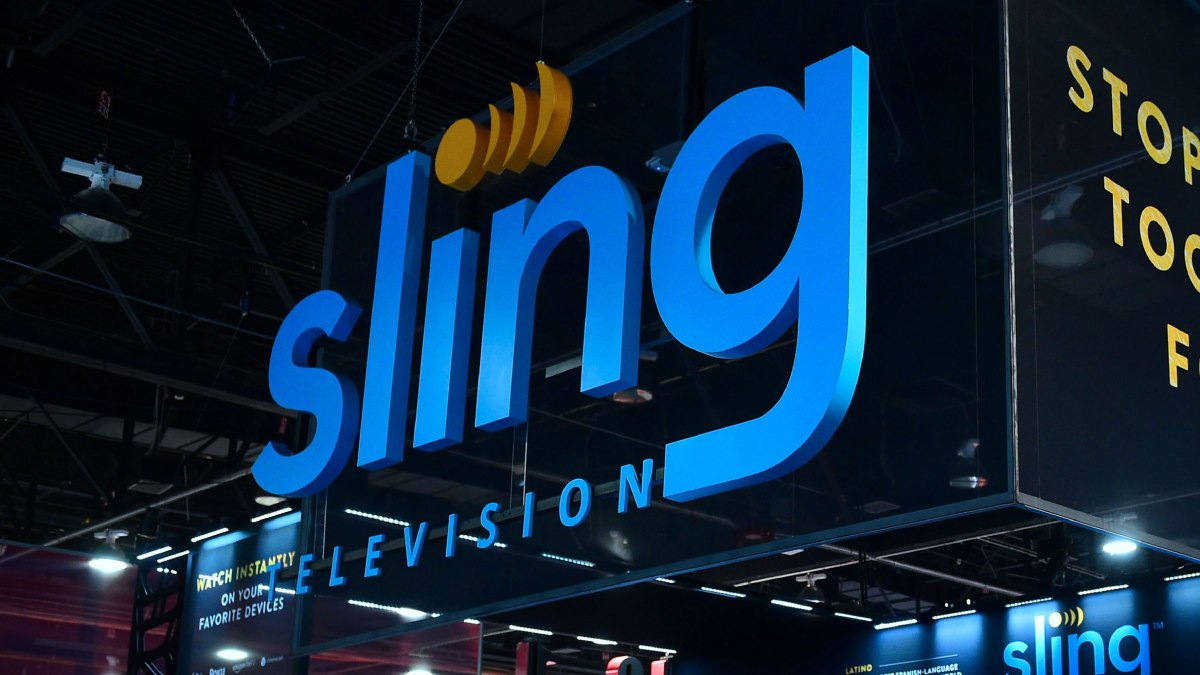Dish-owned live TV streaming service Sling TV is looking to catch up with competitors with the launch of new features like user profiles and the promise of more changes to come in 2023. The company began quietly rolling out the user profiles feature just ahead of the Consumer Electronic Show last week, initially on Android TV and Fire TV devices, with support for more platforms in the near future.
Over the past several months, it’s also expanded its newer direct-to-consumer subscription integrations with the addition of discovery+, which joins 50 other services now available through Sling. And it’s made a Sports Scores feature available across Roku, Fire TV and Android TV devices.
Sports Scores has been rolling out to users since last year, making it easier to access scores from NFL, college football, NBA, NHL and MLB games while continuing to watch live TV or on-demand programming. Meanwhile, Sling TV’s subscription lineup, which now nears 50 services, has been available since last August.

Image Credits: Sling TV
Combined with the rollout of user profiles (which had not yet been formally announced), the changes suggest a streamer that’s again trying to innovate to attract subscribers.
Though one of the early leaders in live TV streaming, having launched in 2015, Sling TV lost traction as newer services like Hulu with Live TV and YouTube TV arrived on the market. For the first three quarters last year, Sling TV faced subscriber losses, for example. However, the company more recently reversed that downward trend in its Q3 2022 earnings in November, when it reported a total of 2.41 million subscribers after 214,000 net additions. But this figure is still down from the 2.6 million subscribers Sling TV had in the third quarter of 2021, for comparison.
Sling TV needs to do more — and faster.
TechCrunch sat down with Sling TV EVP and Sling TV President Gary Schanman in an interview at the Consumer Electronics Show in Las Vegas last week, to find out what’s next for the service in the months ahead.
Sling TV parent Dish hired the industry vet last year, whose experience includes pay TV with roles at Spectrum, Charter and Cablevision (now Altice USA) and in the streaming space. Most recently, Schanman served as chief product officer at Common Sense Networks, where he led the launch of the kid-safe streaming service Sensical. Now he hopes to revitalize the Sling TV brand.
“Over the next number of quarters, you’ll see a lot faster innovation of the product and the product set,” Schanman told TechCrunch. “When people join our company, we expect them to be creative and innovative and be all about winning. And so we’re starting to bring a lot more people into the company to help grow that,” he said.
The company is also looking at how it can better serve the different types of streamers and their needs in the year to come.
“We’re focused on helping consumers find, consume and engage all the content they want. And we are comfortable with a variety of different types of consumers that have different needs. And that includes … people that keep our paid service — and they’re completely subscribed to all of our add-on packs. But it could also be people that come in for a period of time and want to watch some free content,” Schanman said.
“Free is part of our thoughts about how we think about that engagement with the customer. We want a lifelong relationship with the subscriber where they see value in what we provide — and [free content is] a piece of that,” he added.
Schanman couldn’t specifically comment on what Sling TV has in mind around any sort of free streaming plans to come.
But overall, the streaming industry has shifted a lot of its focus in recent months to serving consumers free “live TV” channels, also known as FAST channels, which appear in a grid-like guide that feels more akin to a cable TV experience rather than ad-supported video on demand. Roku, for example, has launched FAST channels via its Live TV Guide as has Amazon with Freevee, in addition to offerings from Pluto TV, Xumo and Plex. For some services, the idea is to lure in customers with free streaming — as Roku does via its free movies and TV hub, The Roku Channel — then upsell them paid streaming subscriptions.
Of course, if Sling TV were to go farther down the free route, it could complicate its relationship with streaming media platforms, like Roku and Amazon, which want to direct consumers to their own free streaming products.
Beyond its plans to innovate on product, Schanman believes Sling TV has other advantages, including being simple and straightforward to use. He also touted the service’s reliability. It’s been a long time since “Game of Thrones” crashed its service, after all. But what Sling TV touts as simple could also be viewed as bare bones, depending on who you ask.
Still, the company believes that Sling TV’s bigger advantage is not necessarily the user interface, but how it organizes its programming into affordable packages. Today, the streamer differentiates itself by way of a la carte programming packages that begin with a base subscription (Sling TV’s “Orange” or “Blue” packages) and various add-ons. Rival services, meanwhile, tend to bundle a larger number of channels into one offering, forcing subscribers to continually pay higher prices as new deals are forged.
“From the live TV perspective, we still have the best value in the market by far. We also have the most flexibility in the market. The truth is, you know, I think we’re a very pro-consumer customer offering. Most of our competitors are what I would call true one-for-one cable replacements, but they’re in some cases more expensive,” said Schanman.
The company plans to talk more about Sling TV’s affordability in the months to come, he said. That message is timely, as consumers are beginning to feel the financial impacts of having too many streaming choices and are facing a market where live TV plans are often no longer cheaper than traditional cable TV.
“We start at $40. So our flexibility and choice is a huge value proposition in the market,” the exec explained. “You can switch between packages any time you want. We have over six add-on packs that, when you add them on, are still less than what you’d have to pay on YouTube TV or Hulu TV,” he pointed out. “The more consumer choices there are, the more that our service has value in the market, because the share of wallet is challenged across the board,” Schanman said.
